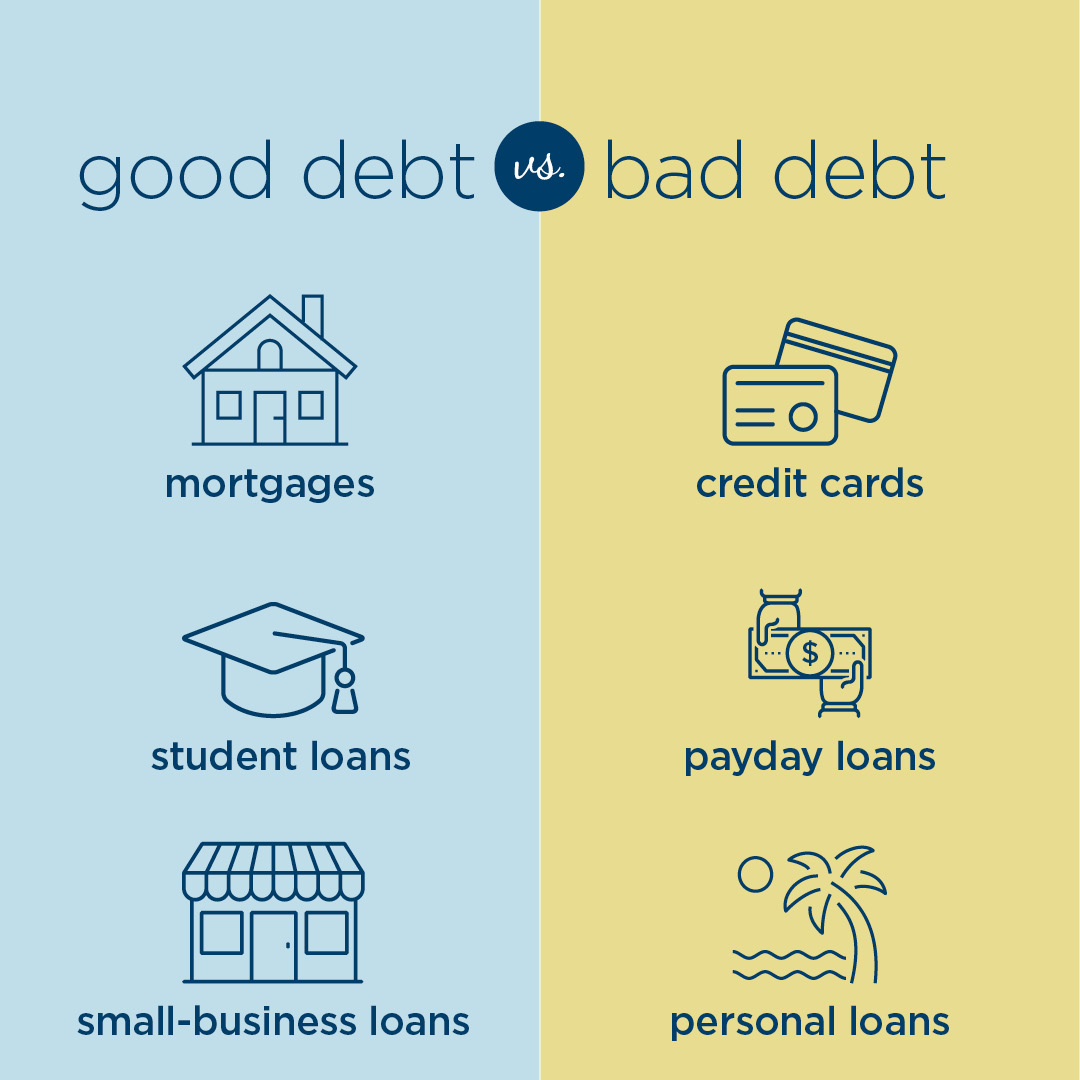“Debt” is a scary word for many of us. If you are “in debt,” it means you owe something (typically money) to someone else, and that’s usually not a great feeling.
Did you know that some debt is considered “good debt,” though? Not all debt is bad – especially not debt that helps you build wealth in the long run.

What is Good Debt?
Good debt is any form of debt that helps you build your net worth.
To clarify, these types of debts are only good if they fit within your means. Always aim to keep your debt-to-income ratio around 40% or lower.
Home Loans
A mortgage loan is one of the largest (if not the largest) loans you’ll ever take out in your lifetime, but it’s also one of the most common forms of debt as most individuals can’t afford to buy a home in cash on the spot.
Despite the sizable loan amount, homeownership is one of the best financial investments you can make.
With every mortgage payment you make, you’re building equity in your home. Equity is the amount of your home’s value you own free and clear. For example, if your home has a value of $300,000 and you have $120,000 left to pay back on your mortgage loan, your equity is $180,000.
If you sell your house, your equity becomes your profit. You can use this as a sizable down payment on your next home. Or, you could do a cash-out refinance and tap into your equity to take out cash for home upgrades, tuition costs, or other large purchases.
While having a mortgage technically means you have debt, the financial benefits of owning a home typically outweigh any negatives.
Student Loans
Student loans are often seen as good debt because they are an investment in your future. Generally speaking, a higher education level provides greater earning potential down the road.
More than half of all college students take out student loans to fund their education. If you’re in this position, just keep your potential career field in mind and use that to gauge your student loan budget. Also, try to take out the smallest loan amount possible that still funds all your expenses such as tuition, housing, and books.
And don’t forget – you can still buy a house and get a mortgage if you have student loan debt.
Small-Business Loans
If you are trying to start or grow your small business, a small-business loan could be a great long-term investment.
Small-business loans are often backed by the Small Business Administration (SBA) and can help cover costs such as:
- Inventory
- Office space
- Machinery or equipment
- Furniture
- Building renovations
- Working capital
Because small-business loans can produce future income to offset the borrowed cost, they are often regarded as “good debt.”
What is Bad Debt?
“Bad debt” is considered “bad” because it doesn’t offer the same benefits or potential to increase your net worth as “good debt” does.
Credit Card Debt
Credit cards, especially those with high interest rates, are an example of bad debt.
Credit card minimum payments are often much lower than the credit limit, which makes it pretty easy to get trapped in a vicious cycle. Let’s say you have a credit card balance of $2,000. The minimum payment is only $50, and it has an interest rate of 16%.
If you just paid the minimum every month, it would take you upwards of 5 years to pay off, and you’d be paying nearly $1,000 in interest. That’s not including any additional purchases you make with the credit card, adding to the balance.
Plus, credit cards are not typically used to purchase appreciating assets. In fact, they are usually used to purchase depreciating assets (clothes, electronics) or consumables (food, groceries). These are not necessarily bad purchases, but they are not worth the double-digit interest rates credit card companies often charge if you don’t pay your statement in full.
On the other hand, there are many ways you can use credit cards to your advantage by building your credit score or earning cash back. It’s all about striking a balance.
To use your credit cards wisely, keep these tips in mind:
- Never charge more than you can pay back at the end of your billing cycle
- Always pay your bills in full and on time
- Keep credit usage at or below 30% of your credit limit
- Use different cards for different purchases depending on their points systems (For instance, if you have a credit card that gives you extra cash back for dining and travel, always use that card for those expenses. If you have another credit card that gives you extra points on grocery purchases, always try to use that card for those expenses)
- Don’t open too many credit cards at once
If you struggle with accruing credit card debt, it may be wise to use a debit card or pay in cash instead.
Payday Loans
Payday loans are small loans (a few hundred dollars) that are meant to be paid off with an individual’s next paycheck – hence the name.
Although this may sound harmless, payday loans typically come with an insanely high interest rate (usually around 400%). Each state has different regulations, but on average you can expect to pay a fee of $10-$30 for every $100 borrowed.
If you can’t afford to pay the loan off right away, you could very quickly be paying more in interest than the original loan amount.
Personal Loans for Non-Essentials
Taking out a personal loan isn’t always a bad thing – but avoid doing this for non-essential purchases, like expensive electronics or vacations.
If you want to take a trip somewhere or make another type of large purchase but can’t afford it with the money you currently on-hand, consider waiting until you have enough saved up.
While these purchases may bring you joy in the moment, you’ll end up paying a lot more for them in interest – which is just not worth it.
For more information on debt, credit, and mortgage loans, visit our Mortgage Basics page or reach out to a home loan expert in your area.





